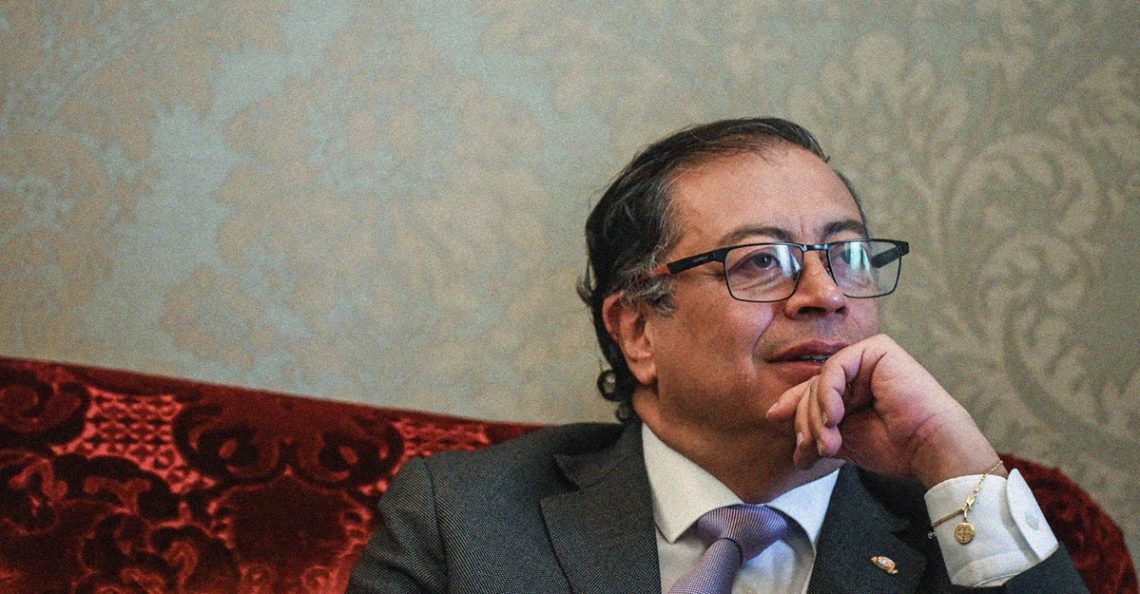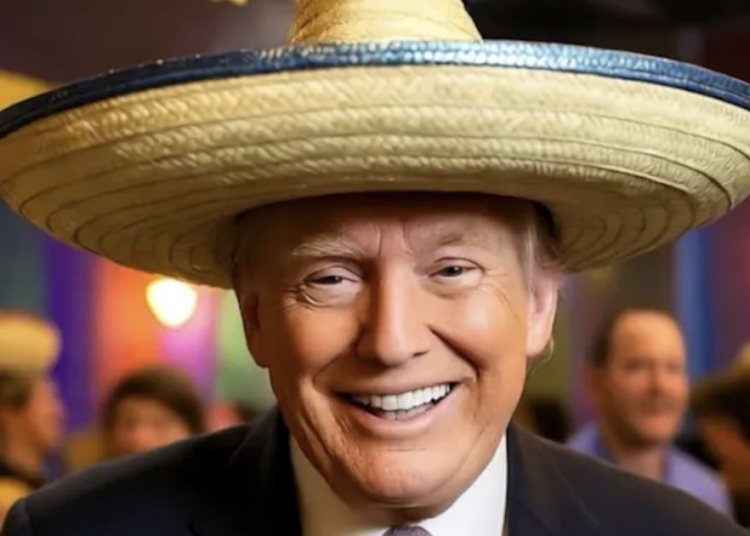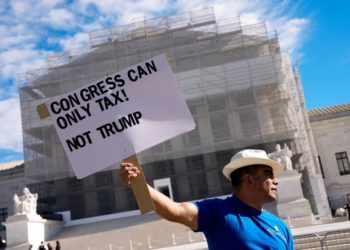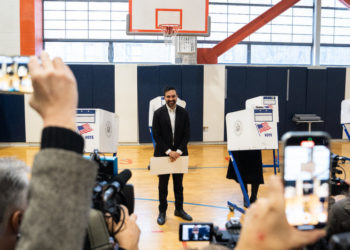Last month, Donald Trump called Colombia’s president, Gustavo Petro, an “illegal drug leader.” That gave Colombians reason to worry: The last country whose president Trump accused of running a drug enterprise was Venezuela, and those accusations served as justification to send a flotilla of warships to lurk by its coasts and blow up boats. Republican officials are now threatening to go to war with Venezuela. If Petro is a drug lord, does that mean that the United States might go to war with Colombia, too?
In an interview with Univision two weeks ago, Petro didn’t appear all that concerned about the prospect. He used the airtime to discuss various other topics, such as his pique at not being invited to the opera singer Andrea Bocelli’s concert in his country. Then, an hour and 20 minutes into the interview, Petro offered what sounded like a Freudian analysis of Trump’s persona, ruminating about genitals and machismo. Toward the end, Petro suggested that David (presumably Colombia) could beat Goliath (presumably America) in a conflict.
Stupefied, the interviewer asked Petro to clarify that his goal was not actually to oust Trump. His goal was negotiation, right? But Petro replied that Trump indeed had to leave, preferably by choice. “That’d be easier,” he said. “If not, Trump should be ousted.”
The moment was rather stunning, not least because the Colombian president seemed so blasé. Historically, threats of regime change have flowed from North to South America, not the other way around.
Shortly after the Univision interview, the U.S. struck another drug boat—this time near Colombia’s Pacific coast, rather than Venezuela’s Caribbean one. More such strikes have followed. Suddenly, American war threats included not just one South American country but two: Trump is considering “future potential military operations against Venezuela and Colombia,” Republican Senator Lindsey Graham told CBS the week before last.
All this may very possibly amount to nothing, at least where Colombia is concerned. But the exchange of insults between Trump and Petro has already strained an alliance that is more than two centuries old—one on which much of Colombia’s economy and America’s anti-drug efforts depend.
The awkwardness between Bogotá and Washington set in soon after Trump returned to power. Jorge Rojas, who was then Colombia’s vice minister of foreign affairs, told me that Petro’s government tried to establish a dialogue with Secretary of State Marco Rubio during the presidential-transition period, but that Rubio showed little interest in talking with Colombians unless they moved in “Miami right-wing” circles, as Rojas put it. Then, a few days after the inauguration, Trump sent two American deportation flights to Colombia, and Petro refused to allow them to land. The Trump administration threatened tariffs in retaliation, and Petro backed off, but relations have remained tense. (A State Department spokesperson told me via email that “the Trump Administration has had plenty of private and public exchanges with Petro and his representatives,” adding that the problem is Petro’s refusal to alter course on his “disastrous and ineffective counternarcotics policies.”)
Since then, Petro has seemed at times to be trying to provoke Trump. Shortly after the first Caribbean strike in September, for example, he joined an impromptu demonstration outside of the United Nations headquarters, in New York City. Many Latin American leaders had condemned the strike, but Petro went further. “I ask all the soldiers of the United States Army not to point their guns at humanity,” Petro said, holding a megaphone. “Disobey the orders of Trump. Obey the orders of humanity.”
Those who have followed Petro’s career see a certain logic behind his grandstanding. “Petro believes in his heart that he can be the face of an international anti-Trump coalition,” John Feeley, a retired American diplomat who was posted in Colombia in the 1990s, told me. A former guerrilla, Petro “wants to leave a legacy that will outlive him, and here’s the best way he can think of doing it.”
Edgar Quintero, a journalist for La Silla Vacía, reminded me that 12 years ago, when Petro was mayor of Bogotá, an inspector general sought to remove him from office. Instead, the scandal made him more popular, and Petro later credited this official with making him president. “Petro is skilled at finding enemies who victimize him,” Quintero said. “Now he’s found the most powerful and important one, which is the president of the United States.”
Last month, Petro complained that one of the U.S. strikes targeting an alleged drug boat near Venezuela had killed a Colombian fisherman. (The United States government supplied no evidence that the boat was in fact transporting drugs.) This was the provocation that finally unleashed a Trump reaction, and a big one. Trump started accusing Petro of being a drug dealer and deployed warships to stalk boats near Colombia. Then the U.S. Treasury added Petro and others close to him to its list of “specially designated nationals,” putting the Colombian president in the company of terrorists and drug traffickers.
Petro is not, in fact, a drug trafficker. The mere allegation has sufficed to inspire more than a week of protests in front of the American embassy in Bogotá. Colombia’s mighty drug cartels funded belligerent groups in an armed conflict that terrorized Colombia in the 1990s. An official peace agreement, signed in 2016, remains somewhat precarious, but the country is much safer and prosperous than it was back then, and many are eager to put the country’s past behind it. Colombia is not the country of Pablo Escobar: More than 30 years after the death of the Medellín kingpin, Colombia’s poets, TikTokers, and Petro himself continue to invoke variations of this assertion. Amalia Salgado, who served as Colombia’s consul general in Houston a few years ago, told me that when she arrived in the United States, she feared that Americans would associate Colombia with nothing but cocaine. She was pleasantly surprised: “They said, ‘País lindo, mujeres bonitas, Cartagena!’” She now worries that recent events will change that.
Whether Petro is at fault for reviving that ugly reputation is a matter of some disagreement inside Colombia. Right-leaning politicians, Salgado among them, blame Petro for taunting Trump and jumping to defend Venezuela’s Nicolás Maduro. “Petro wants to be a world leader, but he cannot even lead the country,” Salgado told me. Petro’s supporters tend to argue that America is the one insulting Colombia’s president, and they are inclined to rally around him. The country is preparing for a presidential election in 2026, and in a party primary held on October 26, Petro’s protégé won the left-wing ticket. Many centrist politicians, including a couple of Petro’s electoral opponents, have defended him. Members of the media have, too: “Our publication takes pride in being critical of the government, whoever is in power,” Quintero, the journalist, told me. “But whatever you say about the president, he’s clearly not a drug trafficker.”
But Petro’s display of bravado could cost his country. Colombia’s economic ties with America are “very, very close, intimate,” Bruce Mac Master, an economist and the head of Colombia’s National Business Association, told me. The United States is “by far our biggest commercial partner,” he said: Every year, the U.S. buys about one-third of Colombia’s exports. As we spoke, Mac Master was preparing to travel to New York and Washington with a delegation of Colombian businesspeople seeking to salvage their country’s relationship with the United States and prevent the Trump administration from imposing the tariffs it promised last month.
One particularly ironic consequence of Trump and Petro’s quarrel is already being felt. Since the 2000s, Colombia has relied on the United States for military assistance in fighting its drug cartels. With that help, Petro’s government has destroyed thousands of coca-paste labs and extradited hundreds of Colombian nationals wanted by the United States. But now that the United States has decertified Colombia as a “drug control partner,” it will no longer supply intelligence to Colombia’s authorities—a move that will almost certainly increase the flow of drugs to the United States more than the boat strikes will reduce it.
The post Why Is Colombia’s President Provoking Trump? appeared first on The Atlantic.




